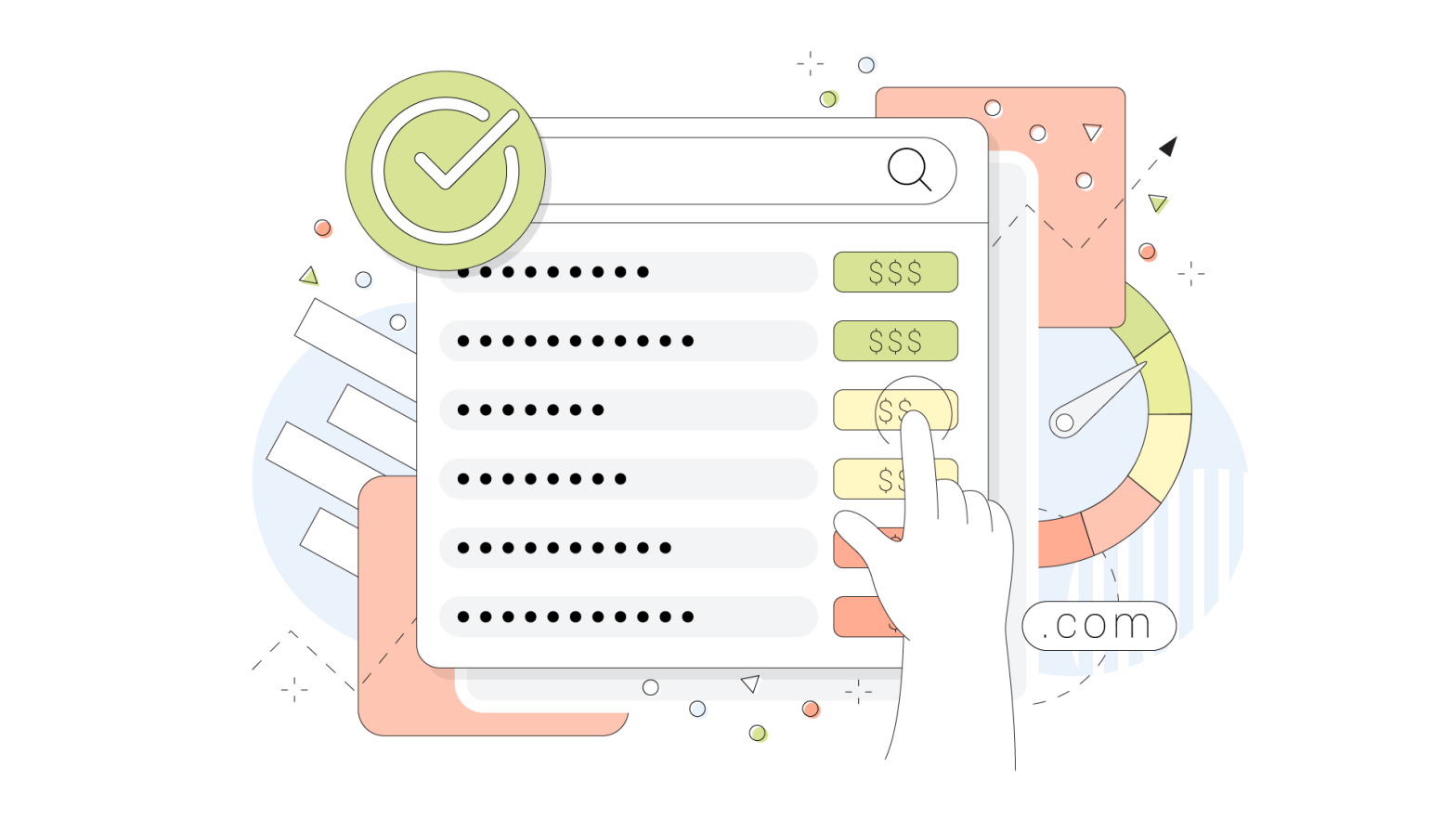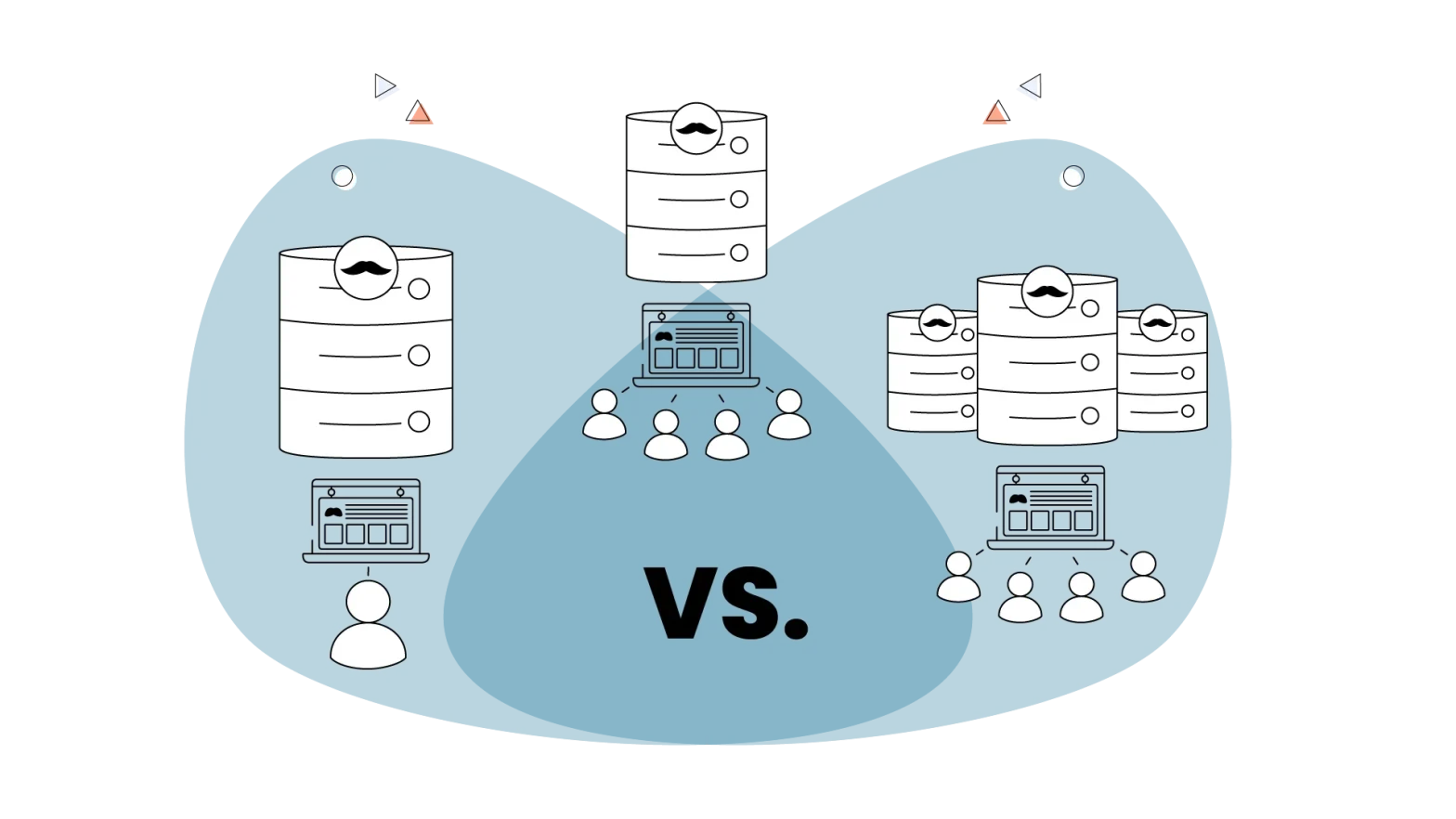You’ve probably heard stories of people selling domains for millions of dollars. It is hard to understand why a web address could be worth that amount of money, but there is actually much more to a domain than the string of characters users type into their browsers to reach a site.
You could be sitting on a gold mine and not even know it.
Unfortunately, calculating your domain’s worth isn’t the most straightforward process. In this article, we’ll go over some of the reasons why you might want to part with a web address, what attributes can influence its value, and various methods you can use to appraise yours.
What Is Domain Worth?
Domain worth is the estimated monetary value of a domain name. It represents the potential selling price of a domain on the market, based on factors such as its brandability, length, keywords, and overall desirability.
Domain worth is determined by several key factors:
- Domain length: Shorter domain names are generally more valuable as they are easier to remember and can be more versatile. A short, catchy domain is likely to fetch a higher price.
- Branding potential: Domains that are brandable, memorable, and unique tend to have higher value. A domain name that can be easily associated with a product, service, or concept is more desirable.
- Keyword relevance: Domain names containing popular keywords related to a specific industry or niche are often more valuable. Having relevant keywords in your domain can also positively impact your search engine rankings.
- Top-Level Domain (TLD): The TLD extension (.com, .org, .net, etc.) can significantly influence a domain’s worth. Generally, .com domains are the most sought-after and command higher prices than other TLDs.
- Market demand: The value of a domain is ultimately determined by how much buyers are willing to pay for it. High-demand domains that attract multiple interested parties can drive up the price considerably.
Why Check Your Domain’s Worth?
A domain is not just a URL, it’s an investment. Your domain name is the bedrock of your digital presence.
Knowing the perceived value of your domain is extremely important, whether you are a domain investor, business owner, or someday want to venture into buying or selling.
Not only is it important to know your value, but it is also important to really understand how much that domain within your portfolio, or the website on the domain, is currently worth, as this carries with it so much for the different important decisions to be made over the years to come.
Here are the top reasons why you should check your domain’s value on a regular basis.
- Pricing decisions: You should know how much a domain is worth in order to buy/sell so that you might set a proper price.
- Investment potential: Value the domains in which you would like to invest so that you can know comparatively where to invest.
- Portfolio assessment: Checking regularly on the value of your assets in your portfolio tells you a lot about the general strength and marketability of your assets. You will be in a position to identify the domains that are appreciating in value and ones that may be underperforming.
- Strategic planning: Knowing the value of your domain portfolio helps you make strategic decisions about which domains to hold, which to sell, and which to develop into websites or businesses.
How to Check Domain Worth in 7 Easy Steps
Valuing your domain can seem like a big task, but it can actually be broken down into a series of smaller steps that will make it simple and effective.
These are 7 easy steps to value your domain name.
1. Research Comparable Domain Sales
One effective way to determine your domain’s worth is by researching recent sales data for similar domains. This gives you a benchmark for what buyers are willing to pay for domains in your niche or industry.
- Use domain sales databases: Resources like NameBio and DNJournal compile extensive data on domain sales across various marketplaces. These databases allow you to search for comparable domains and analyze their sale prices.
- Check domain marketplace sales histories: Popular domain marketplaces like Sedo and Flippa maintain records of previous domain sales. These sales histories can provide valuable insights into the demand and pricing trends for domains similar to yours.
When researching comparable domain sales, consider factors such as the domain’s length, TLD, and keyword relevance. Look for domains that share similar characteristics to yours and have been sold recently.
Also, analyze trends in domain sales within your niche or industry to help you gauge the potential value of your domain. If you notice a consistent increase in sale prices for domains related to your field, it may indicate a higher value for your own domain.
2. Use Online Domain Appraisal Tools
While researching comparable domain sales provides valuable insights, it can be time-consuming and challenging to find exact matches. Online domain appraisal tools offer a quicker and more convenient way to estimate your domain’s worth.
Here are a few popular domain appraisal tools:
- HostPapa Domain Management: HostPapa’s domain management features include tools to help you assess the value of your domains based on factors like length, keywords, and TLD popularity.
- Estibot: Estibot uses a proprietary algorithm that considers factors like comparable sales, search volume, and keyword popularity to provide a free domain valuation.
- GoDaddy Domain Value Appraisal: GoDaddy’s appraisal tool leverages their extensive domain sales data to estimate the value of your domain. It also provides insights into the domain’s potential for generating advertising revenue.
These tools use sophisticated algorithms and vast amounts of market data to provide an estimated value for your domain. They analyze factors such as keyword search volume, advertiser competition, and recent sales of similar domains to arrive at a valuation.
The Pros and Cons of Automated Appraisals
Automated domain appraisal tools offer several advantages:
- Speed: You can get a domain valuation in just a few seconds by entering your domain name into the tool.
- Convenience: Appraisal tools are accessible online 24/7, allowing you to check your domain’s worth whenever you need to.
- Cost: Many domain appraisal tools offer free valuations, making them an affordable option for domain owners.
However, it’s important to keep in mind that automated appraisals have limitations:
- Accuracy: While appraisal tools use advanced algorithms, they can’t perfectly predict what buyers are willing to pay for a domain. The valuations should be treated as estimates rather than definitive prices.
- Subjectivity: Factors like brandability and marketability are subjective and difficult for algorithms to quantify. Automated appraisals may not fully account for these aspects of domain value.
- Market fluctuations: Domain values can change rapidly based on market trends and demand. Automated tools may not always reflect the most current market conditions.
To get the most accurate assessment of your domain’s worth, it’s best to use multiple appraisal tools and compare the results. This will give you a range of estimated values and help you make more informed decisions about pricing and potential sales.
Automated appraisal tools are a quick and easy way to gauge your domain’s value, but they should be used in conjunction with other valuation methods for the most comprehensive assessment.
3. Consider the Domain’s Brandability and Marketability
The memorability, pronounceability, and overall appeal of a domain name significantly impact its worth. A domain that is easy to remember, simple to pronounce, and has a positive connotation is more valuable.
Here are a few things to consider:
- Brandability: Assess the potential for the domain to be used as a strong brand name. Short, catchy, and unique domains that align with a product, service, or concept are highly desirable.
- Marketability: Evaluate the domain’s appeal to relevant businesses or industries. A domain name that directly relates to a specific niche or market segment is more valuable to companies operating in that space.
- Memorable and pronounceable: Domains that are easy to remember and pronounce have a higher likelihood of being shared and typed correctly, increasing their value. “Twitter.com” and “Facebook.com” are excellent examples of memorable and pronounceable domain names.
- Positive associations: Consider the emotional response and associations evoked by the domain name. Domains with positive connotations and no negative or controversial associations are more valuable. “Smile.com” and “Happy.com” are examples of domains with positive associations.
4. Analyze Search Volume and Advertiser Competition for Keywords
Another metric that you should consider while determining the value of your domain is search volume and advertiser competition for keywords in the domain name. If people are searching for your domain’s keywords, this increases the demand for your domain and, hence, the value of your domain.
Additionally, if businesses are competing to rank for those keywords, it means that they are willing to spend money to rank for those search terms. These metrics will help you pinpoint the demand and value of your domain and assist you in valuing it.
Use Keyword Research Tools
Keyword research tools like Google Keyword Planner, SEMrush, and Ahrefs provide insights into the popularity and competitiveness of specific keywords. These tools reveal the average monthly search volume for keywords and the level of advertiser competition.
To use these tools effectively:
- Enter the main keywords from your domain name into the keyword research tool.
- Analyze the search volume data to gauge the popularity of those keywords.
- Assess the advertiser competition to determine the commercial value of the keywords.
Higher Search Volume Indicates Increased Value
Domains containing keywords with high search volumes are often more valuable. The logic is simple: if many people are searching for those keywords, there’s likely a strong demand for products, services, or information related to those terms.
For example, a domain like “BestCoffeeMakers.com” would be more valuable if the keyword “best coffee makers” has a high monthly search volume. This indicates that a significant number of people are actively searching for information about top-rated coffee makers, making the domain more attractive to potential buyers in that niche.
Advertiser Competition Reflects Commercial Intent
Another key consideration is the degree of advertiser competition around your domain name. A high degree of advertiser competition for a keyword means businesses are willing to pay a lot to advertise for that keyword, which is a good indication of commercial intent.
Having a high CPC and/or many advertisers bidding on some or all of your keywords, is a signal that a domain has commercial value. Advertisers are prepared to pay higher CPCs for keywords that are likely to convert into sales or leads.
For example, if the keyword “buy coffee makers” is high for CPC and advertiser competition, a domain such as “BuyCoffeeMakers.com” would be viewed as having value because it suggests that sellers of coffee makers have a high incentive to purchase traffic through search advertising.
As e-commerce and online advertising continue to expand, it’s increasingly critical to research search volume and advertiser competition. If you have a premium domain that contains valuable keywords, your ability to sell or invest in it will be greatly enhanced by understanding these factors.
5. Examine the Domain’s History and Backlink Profile
A domain’s history and backlink profile provide valuable insights into its worth. Older domains that have been consistently registered and used tend to have a higher value compared to newly registered domains.
These are the things to look for:
- Check the domain’s age: Use tools like Whois to determine when the domain was first registered. Domains that have been around for several years are often seen as more established and trustworthy, which can positively impact their value.
- Analyze the registration history: Look for any gaps in the domain’s registration history. A domain that has expired and been re-registered multiple times may have a lower value compared to one with a continuous registration history.
- Assess the backlink profile: Use tools like Ahrefs or Moz to analyze the quantity and quality of backlinks pointing to the domain. A strong backlink profile with links from high-authority websites can significantly increase a domain’s worth.
- Evaluate the quality of backlinks: Focus on the quality of the backlinks rather than just the quantity. A smaller number of high-quality, relevant backlinks from reputable websites carries more weight than a large number of low-quality or spammy links.
- Consider past uses and associations: Research the domain’s history to uncover any previous uses or associations that may affect its value. A domain with a positive history and reputable associations is more valuable than one with a negative reputation or a history of spam or malicious activity.
The domain’s history and backlink profile will matter greatly in that regard. As more people come to rely on online (reputational) worth and as importance is given to the issue of backlinks influencing search rankings, a domain with a sterling and clean history will indeed be valuable.
6. Get Professional Appraisals for High-Value Domains
If you have a particular suspicion that your domain is especially valuable, you can also choose to pay for an appraisal. Paid domain appraisal services offer professional opinions and detailed reports on valuations derived from analyses of the market and industry experience.
Professionals working for appraisal services examine a range of factors, including whether a domain name is short, whether it includes a specific keyword, whether other domains are selling for similar amounts, whether domains like yours have been sold before, and how active the market is for this kind of domain name.
Accessing this type of data and expertise is likely to result in a more detailed and precise valuation compared to using automated tools.
This can be particularly useful if you are considering selling a domain since having a professional appraisal can help you justify your asking price. It is not a regulation but rather a best practices guide.
When you put your domain up for sale, it will go through this process.
Benefits of Professional Domain Appraisals
- Expertise: Professional appraisers have extensive knowledge of the domain market and can provide accurate valuations based on current trends and historical data.
- Comprehensive Analysis: Paid appraisal services conduct in-depth analyses of your domain, considering factors like comparable sales, market demand, and potential for future appreciation.
- Credibility: A professional appraisal report can lend credibility to your domain’s value, which is especially useful when negotiating sales or seeking investments.
When to Consider Professional Appraisals
- High-Value Domains: If you believe your domain is worth a significant amount (e.g., five figures or more), a professional appraisal can help you substantiate its value.
- Premium Domains: A professional appraisal can provide a more accurate valuation for premium domains that are short, brandable, or contain high-value keywords.
- Legal or Financial Purposes: A professional appraisal is often required if you need a domain valuation for legal proceedings, tax purposes, or to secure investments.
Reputable Domain Appraisal Providers
If you’re looking for a reliable and professional domain appraisal service, check out GoDaddy and Domainindex.
These providers have a proven track record of delivering accurate and reliable domain valuations. They employ experienced appraisers who use industry-standard methodologies and have access to extensive domain sales data.
They’ll look at your domain and give you a detailed report that includes an estimated value and supporting analysis.
Keep in mind, though, that this kind of professional service can be expensive, usually costing from a few hundred to several thousand dollars, depending on the appraiser and the level of detail you need.
But if your domain is very valuable, the investment in a professional appraisal can be worth it, giving you a valuation that’s credible and defensible.
Final Thoughts
Learning how to determine the value of your domain is crucial for maximizing your investment and making informed decisions. Whether you’re buying or selling domains, building an online business, or managing a portfolio, understanding your domain’s value is key.
By comparing sales, considering keyword relevance, and seeking input from appraisers and brokers, you can gain a good idea of your domain’s value.
For those looking to dive deeper into analyzing and monetizing their domain portfolio, HostPapa’s team of experts is here to help. With our domain management and appraisal services, you can optimize your portfolio of domains while avoiding common pitfalls.
Visit HostPapa’s Domain Services to learn more and get the most out of your domain names today!
How to Check Domain Worth: Frequently Asked Questions
How Often Should I Check My Domain’s Worth?
Regularly monitoring your domain’s value, perhaps annually or bi-annually, is wise. This can help you stay informed about market trends and make timely decisions regarding your domain portfolio.
What if My Domain’s Estimated Worth Seems Too Low?
If the valuation doesn’t meet your expectations, consider the factors that might be influencing its worth. Enhancing the domain’s SEO, developing a site with quality content, or improving its backlink profile could increase its value over time.
How Much Can a Domain Name Be Worth?
A domain name’s worth can vary widely, ranging from a few dollars to millions, depending on factors like keyword relevance, domain length, market demand, and the domain’s extension. Highly sought-after domains, especially those with short, memorable names or popular keywords, can fetch higher prices.




